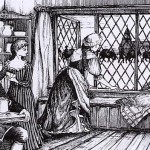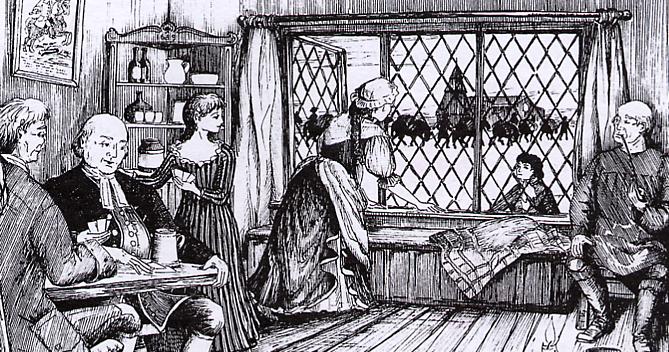By Eric Streeton.
This area of Sussex is very rich in History especially smuggling, with many very well recorded episodes of this illicit trade. Usually it is the more notorious gangs such as the Hawkhurst Gang that people become familiar with. But I would like to tell you about my smuggling ancestors that I discovered when researching my family history. But first I must put things in perspective for you. The two families concerned are from my Grand Mothers line, she was born Mary Ann Julia Buttonshaw in 1869, and her Mother was born Rhoda Monk in 1833. (Where records have spelt the name as Buttonshaw or Buttenshaw I have used these spellings).
When I was a youngster it was always known in our family that Grand Mothers forbearers had been Smugglers, but it was when I started researching my Grand Mothers family line that proven facts were now coming to light. The first name to come to light was that of Henry Buttonshaw, who was to my knowledge a fisherman from German Street in Winchelsea. Here are his recorded exploits.
Ancient Town of Winchelsea
The County of Sussex} to wit Thomas Hill of Winchelsea in the Parish of Winchelsea in the said county, one of the Officers of the Duties of Excise, and Inland Duties of Coffee,, Tea, &c. maketh Oath, and saith, That he, this Deponent, hath cause to suspect, and doth suspect, that Run Goods is fraudulently hid and concealed in some Place or Places in or about the said House of Henry Buttonshaw in the Parish of Winchelsea in the said County, with an Intent to defraud His Majesty of the Duties thereon, for that this Deponent hath received on information
Thomas Hill

Sworn at Winchelsea
Twenty eighth Day of February 1815 before me G Stace.
Then again Henry Buttenshaw’s name crops up on the 14th day of May 1824 with an almost identical deposition sworn against him, but this time the excise officer was a William Granger from the Parish of Brede. Granger’s statement read as follows
Saith he had his information from a reputable Housekeeper and he believes this information to be true.
This does leave some answered questions for me though. Was he was concealing run goods at his home? To date I have not found any evidence he was ever convicted for such an offence. Why was he informed on, could it have been spite, envy, or for self reward? Also was this the same Henry Buttonshaw who in 1809 was listed in the local Militia Return as eligible for service? He was then aged about thirty.
I then found the name of George Buttenshaw who was one of twelve men held in Goal for breach of revenue offences between 1828 and 1830. Once again this has left me with more questions than answers. Was this the same George Buttenshaw whose Wife Eliza, and Daughter Lucy Ann, on the sixteenth of August 1830 had a Removal from the parish order served upon them, to return them to Pett.
In the course of my research I had been corresponding with two Buttenshaw family members, Doug in Scotland and Alan in Australia, between them they filled in many gaps in my research. But it was not until chance conversation with a visitor to our house my research took a new direction. It was about three years ago when I had produced a small feature for Rye’s Own, and my visitor picked up upon one of the name’s I had used in it, it was the name of Monk. My Mother has been researching this name he said, when I see her on the weekend I will see what information she has got. With him he took a copy of a Marriage certificate for Edward Buttonshaw and Rhoda Monk. When he next called what a treasure trove he had bought with him. Here were her Parents names, and a list of all of Rhoda’s Brothers and sisters, but it was to be her oldest Brother Thomas who was to be the biggest surprise for she had enclosed a copy of Thomas Monk’s Death Certificate.
Where and When died. The first of April 1838. Three o’clock in the morning Rye Bay. Parish of Winchelsea.
Name. Thomas Monk.
Age 28
Occupation. Labourer and Smuggler.
Cause of Death. Found Dead on Rye Bay. Shot dead by a Musket Ball by some person unknown.
Here is a brief account of Thomas Monk’s final Hours.
At a quarter to three in the morning on the First of April 1838 in Rye Bay, a boat was landing a cargo of spirits. Nearly all the barrels had been unloaded from the boat and were already being transported away from the scene. Then for some unknown reason the Boat ran aground. Before long the party of about fifteen smugglers were spotted by the Excise Men, and a fire fight ensued between the two parties with the Smugglers melting away into the night. When the Excise men checked the boat out they found only one tub left on board her. But floating in the water near by they found the body of one Thomas Monk; he was just twenty eight years old. An inquest was held on the very next day, and the Jury concluded the he had been killed by a gunshot wound by an unknown person. He was buried in Winchelsea Church Yard on the Ninth of April 1838. Rhoda would he been just five years old at the time of his death. Also I have found the name of Gurr connected with Smuggling in Sussex in 1737, I mention this because Thomas Monk’s Mothers maiden name was Gurr. Another recorded occupation for Thomas Monk was that of a fiddler. Now this had me stumped what on earth was a Fiddler? According to a Web Site on old trade names their definition of a Fiddler was some one who used a Fiddle (a small knife) to remove the flashing from cast of clay forms, such as a bowl, creamers, cups or pitchers. If there are any readers out there who know differently I would be pleased to hear from you.
It had been suggested in one book on the subject of Smuggling, that one of the legalities that hampered the excise officers in their fight against the illicit trade was the fact that Foreign Nationals could not be charged for Smuggling Offences. This led to some English men pretending to be Dutch, and allegedly some of the Smuggler’s spouses giving birth to their babies in France or Holland to ensure that they had Foreign Nationality. “Was this the reason that my Great Grandfather Henry James Streeton was born in France in 1828?” This is pure speculation on my part though. But I do know that he was a Seafaring man in 1853, but by then the illicit trade was well on the decline. If he was ever involved in any thing untoward it was never out worldly visible. In fact, as his life progressed he became quite a figure of respectability and substance. Even my dear old Dad’s Christian names of Edward and George were both names used repeatedly in the Buttonshaw family, but very rarely found in the Streeton family.
On Rhoda Buttonshaw’s death certificate in 1914 the informant’s name coincidentally was E Streeton. So as you can see after quite a passage of time they were all still as thick as thieves.
(Foot-note completely unrelated to Smuggling, but relating one Family of the Buttenshaw’s or Buttonshaw’s mentioned in the above text. George and Eliza Buttenshaw also had a son George Frederick Buttenshaw. At the age of twenty four he was working as a Chief Steward on The Ship Strathmore of Dundee which sailed from London to Otago, ( New Zealand ) with a crew of thirty eight, and carrying fifty one passengers. On the 1st day of July 1875 the Dundee Struck Apostle Island at the north western end of the Crozet group, here they were Shipwrecked for a period of approximately six months. George Frederick kept a diary of the survivors times on this Island. And once again coincidentally, I learned of this 130 years to the day after the ship wreck.)
“Rye’s Own” September 2015
All articles, photographs, films and drawings on this web site are World Copyright Protected. No reproduction for publication without prior arrangement. © World Copyright 2015 Cinque Ports Magazines Rye Ltd., Guinea Hall Lodge Sellindge TN25 6EG
